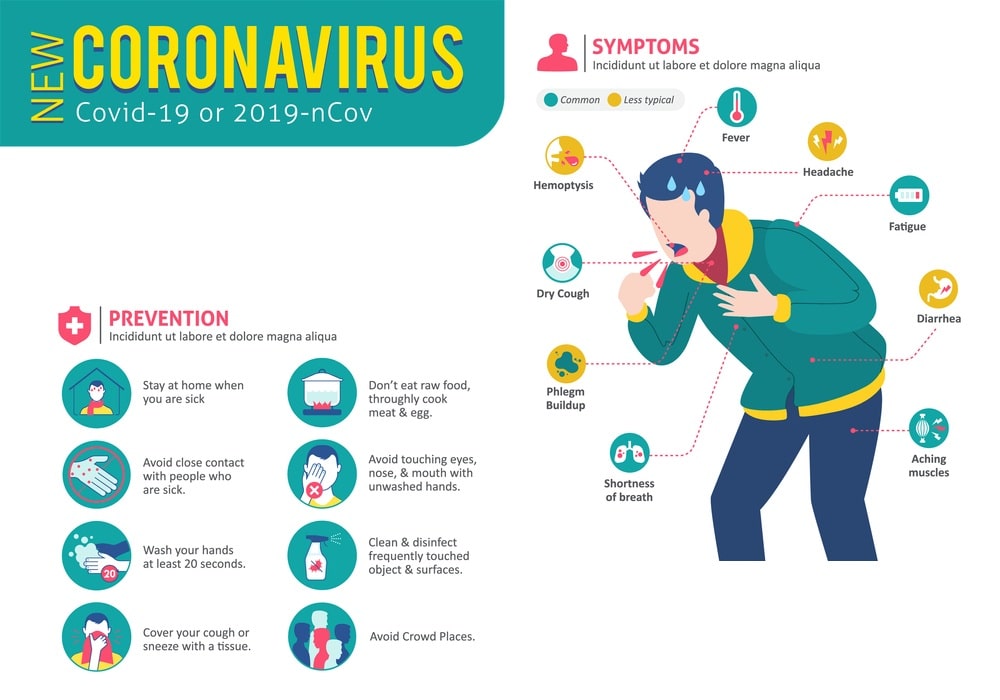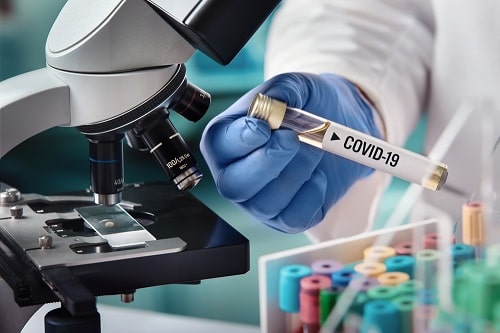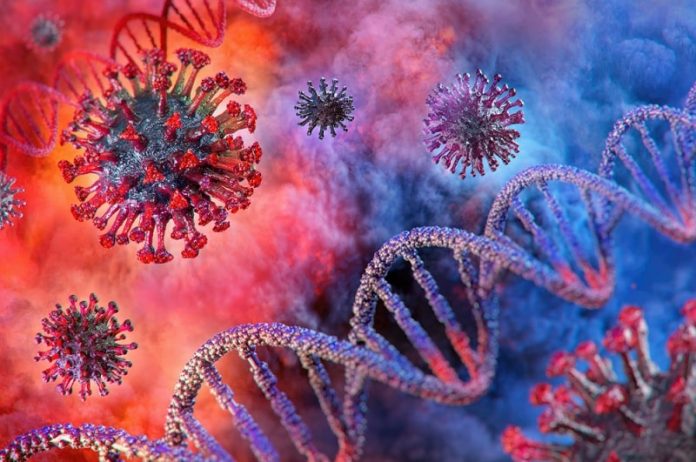There’s a lot of misconceptions out there and we are here to clear some of those up. The first question that I had personally was. Where did they get the name COVID-19? Well, it comes from Coronavirus disease that started in Wuhan China in 2019.
Hence the name COVID-19 as we all know by now the disease started. It in Wuhan China in a seafood market that sold live animals and somehow it jumped from the live animal to the person which is relatively common. We see that with other viruses as well. And then once one or two people got infected, it was a person-to-person transmission.
I want to just remind everybody that the main mode of transmission is respiratory droplets.
That means when a person coughs, sneezes or even when they talk, They’re emitting respiratory droplets. when you’re talking to another person; these respiratory droplets land on surfaces, then you touch those services and unknown to you then touch your eyes, nose, mouth and that’s how the virus is spread to you, A lot of people say I don’t ever touch my face. Ace that’s not true you touch your face so many times during the hour and you just don’t even realize it.
So it’s easily contracted and easily transmissible from one person to the next, the estimated incubation time after exposure is about 4 to 5 days, but it can last or can occur from two to seven days.

Do Can Coronavirus (COVID-19) symptoms show after 20 days of exposure?
It usually takes four to five days after exposure you start to have symptoms. If you’ve contracted it, most people have mild symptoms most meaning 80% of the people that are exposed or contract the virus have very mild symptoms 99% of people that have this illness get a fever.
It can be a mild fever 99 degrees or higher but 99% of people with COVID-19. Have a fever. other people seventy per cent have fatigue 59%, cough 35% have body aches 15% of the people that get COVID-19 start to have severe symptoms such as hypoxia, which means a low oxygen saturation, you know, the little pulse oximeter is that they put on your fingers when you’re in the doctor’s office, that’s a pulse ox.
So if that number is lower than 99% that’s not normal and so hypoxia.
A low pulse ox number.
Also, you may the persons with severe disease start to have greater than 50% lung involvement.
That means they’ll start to have infiltrated and they’re all types all kinds of different infant infiltrates, but if greater than 50% of the lung is involved that’s concerning and that means they have severe disease.
And then there is that critical 5% These are patients that progress on to respiratory failure requiring intubation is when you’re connected to mechanical ventilation, a tube is placed on your throat, you’re sedated and your collect connected to a life-support machine.
It’s a big deal of other symptoms that can happen when you have critical diseases that your organs may start to fail.
You may go into something called sepsis where your blood pressure. It’s really low and we’ve been seeing some interesting cardiovascular deaths related possibly to viral car dilated cardiomyopathy, which is when the heart gets enlarged because of the virus and I don’t know much about that quite yet. I think we’re still learning a lot about it.
How are the most severe cases of coronavirus?
The most severe cases and curb and patients that are old meaning that they’re older than 65 and especially if they’re older than 80 when you hear about those deaths on TV, take note of the age most of Them are quite a bit older than you or you know in their late 80s.
Patients that have comorbidities meaning have other illnesses like cardiovascular disease. So if you’ve ever had a heart attack or a stroke if you have diabetes, especially if it’s uncontrolled if you have any sort of lung diseases like COPD, emphysema, smoke, high blood pressure, or if you’re currently being treated for cancer or have had cancer and they are currently on immunosuppressants like prednisone or other prednisone like medications.
Those are the patients. It’s that tend to have a more severe disease for those that have severe disease. Here’s the timeline of what we’re seeing shortness of breath usually occurs at about five to six days admission to the hospital occurs at about 7 to 8 days and ICU admission, intubation usually occurs at about 10 days, but the progression to respiratory failure can be rapid and quick which is concerning.
An early warning sign for the severe and critical disease is something called hypoxia, which is what I mentioned the low O2 saturation, but you may not have many symptoms. But that is something that your doctor should be aware of and take note of and you should be in Daily communication with him or her if you’re found to have hypoxia, but you’re not having other symptoms hypoxia once again as a low to low oxygen saturation.
The most interesting thing about coronavirus
The most interesting thing about this virus is that the viral shedding can occur before symptoms even develop they begin to decrease five days after exposure, but they can last up to 10 days.
So people that don’t that have very mild symptoms are actively shedding this disease and giving it to other people.
A great bit of information about COVID-19 is that children are greatly spared from these debit devastating effects from the coronavirus.
We’re just not seeing very many deaths in children, and we so thankful for that.
The first thing is you don’t need any blood work.
Unless you’re hospitalized.
Can I get COVID-19 blood tests done without the permission of my doctor?

We just don’t the labs aren’t going to help determine when way or the other they’re not that helpful the white blood cell count which often determines whether someone has an infection or not can be high or can below. So at the end of the day, I just don’t think you should be asking your doctor to have blood drawn. The other thing is don’t wear a mask. If you don’t have a cough, or if you don’t have symptoms, you’ll touch your face more.
And then those that need to have mass won’t be able to get them. You should wear a mask. If you have a cough, or if you’re caring for someone that you’re concerned. They have COVID-19 or if that person has a cough.
My next big bone of contention is who should be tested I think only patients that are older with a fever of 99 degrees or higher and they should be tested both for influenza and COVID-19.
If you’re young and otherwise healthy, don’t go get tested right now.
It’s complicated and you’re slowing down the system and your burdening A system. That just doesn’t need to be burdened right now.
However, if you’re older or if You have other diseases like the ones I mentioned and you have a fever of 99 degrees or higher. You should go get tested.
Where do you go?
That’s we’re still working a lot of those details out, but call your doctor or your primary care physician or provider.
They have information about where to send you drive-through clinics are being set up in cities all over the United States and some testing is being done through the city Health Department. The treatment is not with antivirals there have not been we have not found an antiviral that’s been effective against COVID-19.
So there’s not a prescription medication that’s been shown to be effective things like medications that lower fever-like Tylenol are helpful medications that help suppress. Your cough can be great just to provide comfort.
The most important thing is that if you have a fever and a cough, then you should isolate yourself to prevent transmission to someone else especially the older population and the United States.
You should stay in contact with your doctor over the phone and try to decide if you’re someone that may need to go to the emergency room.
If you decide that you do need to go to the emergency room because you’re experiencing shortness of breath or that dyspnea that I talked about.
It’s so important to call them before you go. And call your doctor to make them aware.
How long should you isolate yourself after you have these symptoms?
Remember? I’m not advising that everyone gets checked for COVID-19.
So you may not be sure that you’ve had it or not.
But if you have a fever and a cough and fatigue, then we can probably assume that you have COVID-19 or influenza and I would say that you should isolate yourself, 100% Aunt, for as long as you do not have a fever for 72 hours on no medications so you can’t be taking medications to lower your fever and go out that that that’s not the same as being fever free without medications for 72 hours interestingly enough in the United Kingdom. They’re recommending that people stay completely isolated 7 days after the start of their symptoms and that’s from milder cases, of course as Always I think one of the most reputable websites for up-to-date information is cdc.gov.
There’s a lot of misinformation out there and I want to help reassure rather than continue to cause irrationality and increased fear.
So at the end of the day, one thing that I want everyone to take home is that if you have a fever a mild fever cough and fatigue you may have COVID-19.
But before you rush out to go get tested think about whether you’re in a high-risk category or not. If you’re not in a high-risk category, I would say hold off going to get tested for now that may change as testing availability increases, but for now leave the test to the older adult and the people that have immunosuppression and comorbid conditions, like diabetes high blood pressure and the other things that I mentioned stay safe out there remember to wash your hands for 20 seconds. That’s important.
And one of the main ways that we can prevent transmission from one person to the next and when you wash your hands be sure to rub your hands together because it’s the friction that takes the virus off your hands.
If you don’t have access to soap and water and alcohol-based anti-infective don’t like without has 60% alcohol or more are great as well. But you need to let them dry on your hands while you’re rubbing them together and don’t wipe your hands on something else. To take the alcohol a disinfectant off if you’re unable to find an alcohol disinfectant. There are lots of resources online about how to make your own.

